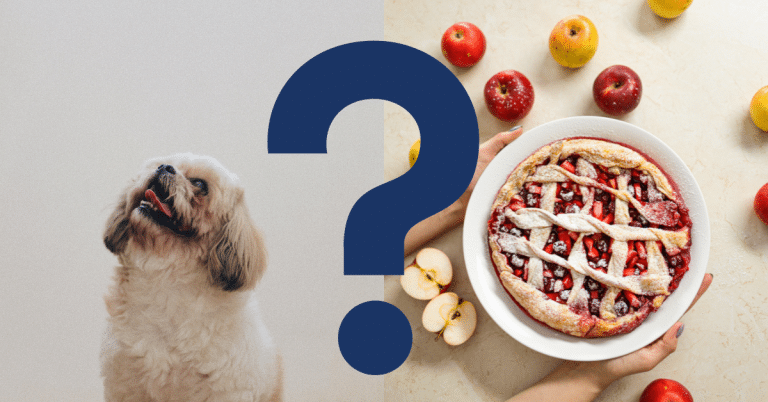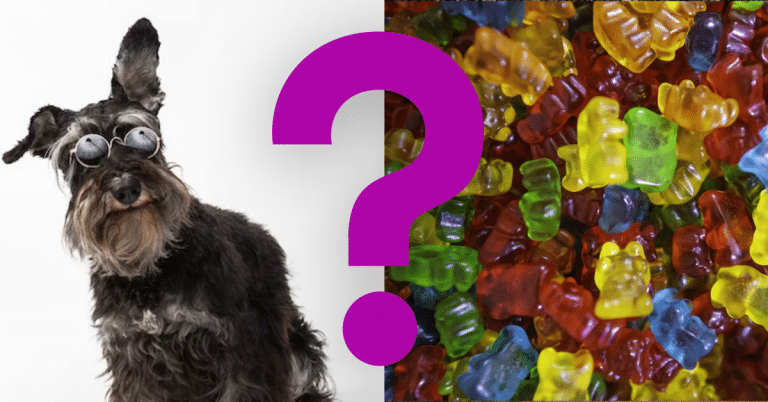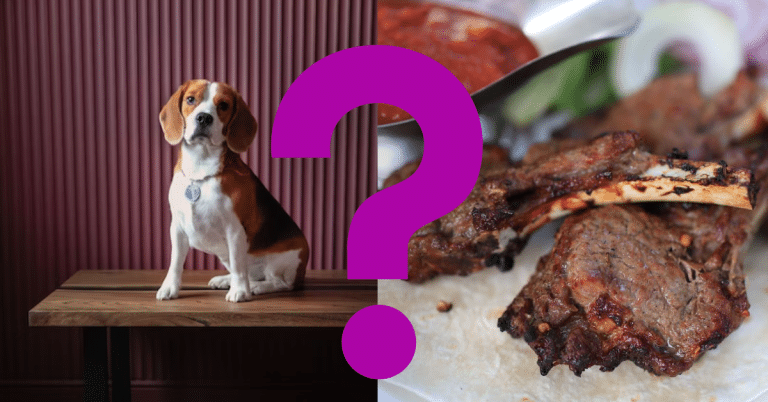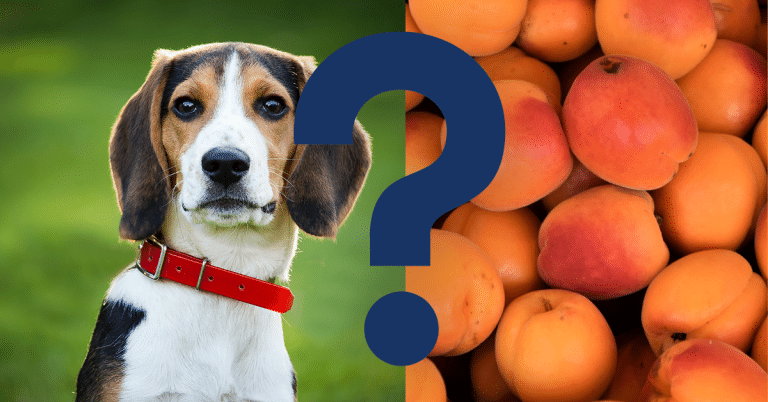Can Dogs Eat Granola? A Vet’s Opinion

Granola is a breakfast food typically made from rolled oats, nuts, honey or other sweeteners, and sometimes dried fruit. The ingredients are mixed together and baked until crispy, resulting in a crunchy and nutritious cereal. Granola can be enjoyed on its own as a snack or as a topping for yoghurt, smoothie bowls, or oatmeal, but can you feed Granola to your dog?
It would be best if you did not feed Granola to dogs as many granolas contain ingredients that can be harmful or difficult for dogs to digest. Some granolas may also be high in sugar or other additives that can contribute to obesity and other health issues in dogs. It is generally best to avoid feeding Granola to dogs altogether and opt for dog-specific treats that are formulated to meet their nutritional needs.
Let’s dive in:
Benefits Of Granola For Dogs
Some of the ingredients commonly found in Granola, such as oats and nuts, can be beneficial for dogs when given in moderation and in appropriate forms. Oats are a good source of fibre, which can help improve digestion and promote regular bowel movements in dogs. Nuts, such as almonds or peanuts, are a good source of protein and healthy fats that can support a dog’s skin, coat, and overall health. However, it is essential to note that nuts should be given to dogs in small amounts and unsalted, as too much salt can lead to sodium toxicity in dogs.
If you are looking to provide your dog with a similar crunchy texture to Granola, you can offer them small amounts of plain, unsweetened oatmeal or rice cakes as a treat. These options provide a satisfying crunch without the added risks associated with Granola. Additionally, there are many dog-specific treats and snacks available on the market that are formulated to meet a dog’s nutritional needs and provide a range of health benefits. When in doubt, consult with a veterinarian for guidance on the best treats and feeding practices for your individual dog.
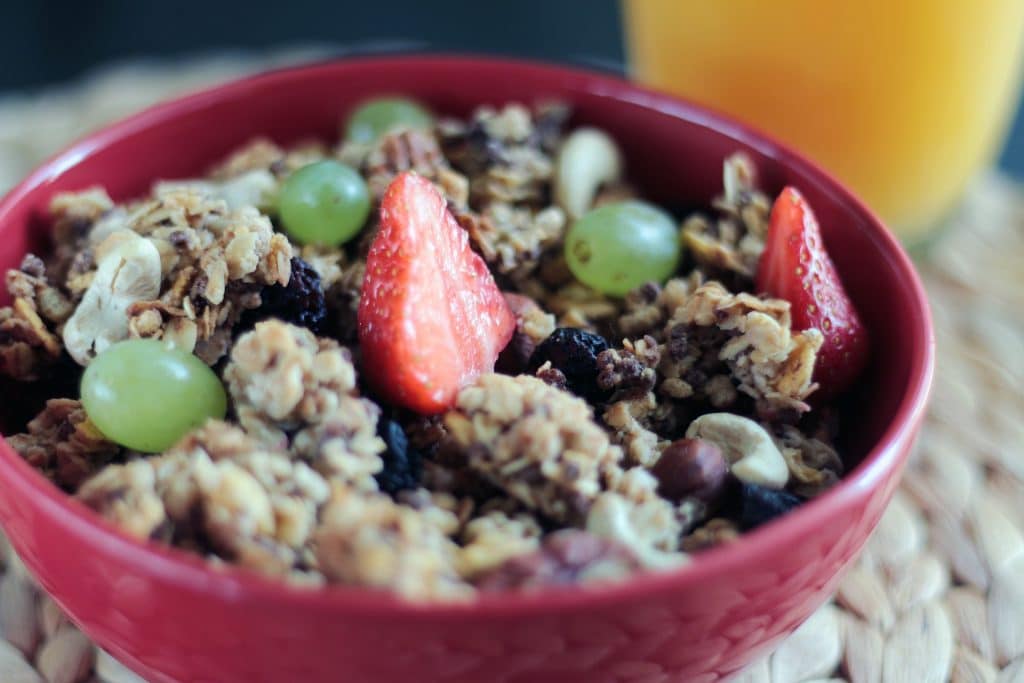
How To Safely Give Granola To Dogs
Since giving Granola to your dog isn’t beneficial, we will explain some of the ways you can safely give it to your dog. If you would like to offer your dog a small amount of plain, unsweetened Granola as an occasional treat, there are some safety precautions to keep in mind. Firstly, it is essential to ensure that the Granola does not contain any ingredients that are known to be toxic to dogs, such as chocolate, raisins, or artificial sweeteners. Check the ingredient label carefully before offering any granola to your dog, and avoid any brands that contain these ingredients.
Secondly, be mindful of the portion size. While a small amount of plain, unsweetened Granola may not cause harm to dogs, overfeeding can lead to digestive upset or even obesity in the long run. Aim to offer your dog a small pinch of Granola as a rare treat rather than a regular part of their diet. If you are concerned about the potential risks associated with feeding Granola to your dog, consider offering alternative treats that are formulated to meet a dog’s nutritional needs and are less likely to cause harm. Examples of safe and healthy dog treats include dental chews, freeze-dried meats, and fresh fruits and vegetables.
Will Granola Make A Dog Sick?
There are several risks associated with feeding it to them. Many granolas contain ingredients that are difficult for dogs to digest, such as nuts, seeds, and dried fruit. These ingredients can cause gastrointestinal upset, including vomiting, diarrhoea, and stomach pain. Additionally, some granolas may contain high levels of sugar or other additives, which can contribute to obesity and other health issues in dogs. Another risk associated with feeding Granola to dogs is the potential for choking or intestinal blockages. The crunchy texture of Granola can cause pieces to become lodged in a dog’s throat or digestive tract, leading to breathing difficulties or even life-threatening obstructions.
Some granolas also contain ingredients that are known to be toxic to dogs, such as chocolate, raisins, or artificial sweeteners. Even a tiny amount of these ingredients can cause serious health problems in dogs, including kidney failure and seizures. It is important to note that even if the Granola does not contain any harmful ingredients, it is still not recommended to feed it to dogs as a regular part of their diet. Dogs have different nutritional requirements than humans, and feeding them foods that are not formulated to meet their specific needs can lead to nutrient imbalances and health problems over time. Hence, it may be tempting to share your Granola with your furry friend; it is generally best to avoid feeding it to them altogether.

Vet’s Summary
Granola may seem like a healthy snack option for dogs; it is generally not recommended to feed it to them. Granola can contain ingredients that are difficult for dogs to digest, high levels of sugar or additives, and even toxic ingredients. Feeding Granola to dogs can also increase the risk of choking or intestinal blockages. It is best to opt for dog-specific treats that are formulated to meet their nutritional needs and to consult with a veterinarian for guidance on the best feeding practices for your individual dog. However, it would be best if you incorporated probiotics into your dog’s diet. Probiotics are live microorganisms that can provide several health benefits to dogs. They help maintain a healthy balance of good bacteria in the gut, which can improve digestion, boost the immune system, and reduce inflammation. Probiotics can be particularly beneficial for dogs with digestive issues or those who have been on antibiotics, which can disrupt the natural balance of gut bacteria. Adding probiotics to your dog’s diet can be done through supplements or by feeding foods that contain probiotics, such as yoghurt or kefir.
Videos To Watch
If you are wondering if granola is good to give your dog, watch this:
And if you want to know what a dog can NOT eat, watch this:

